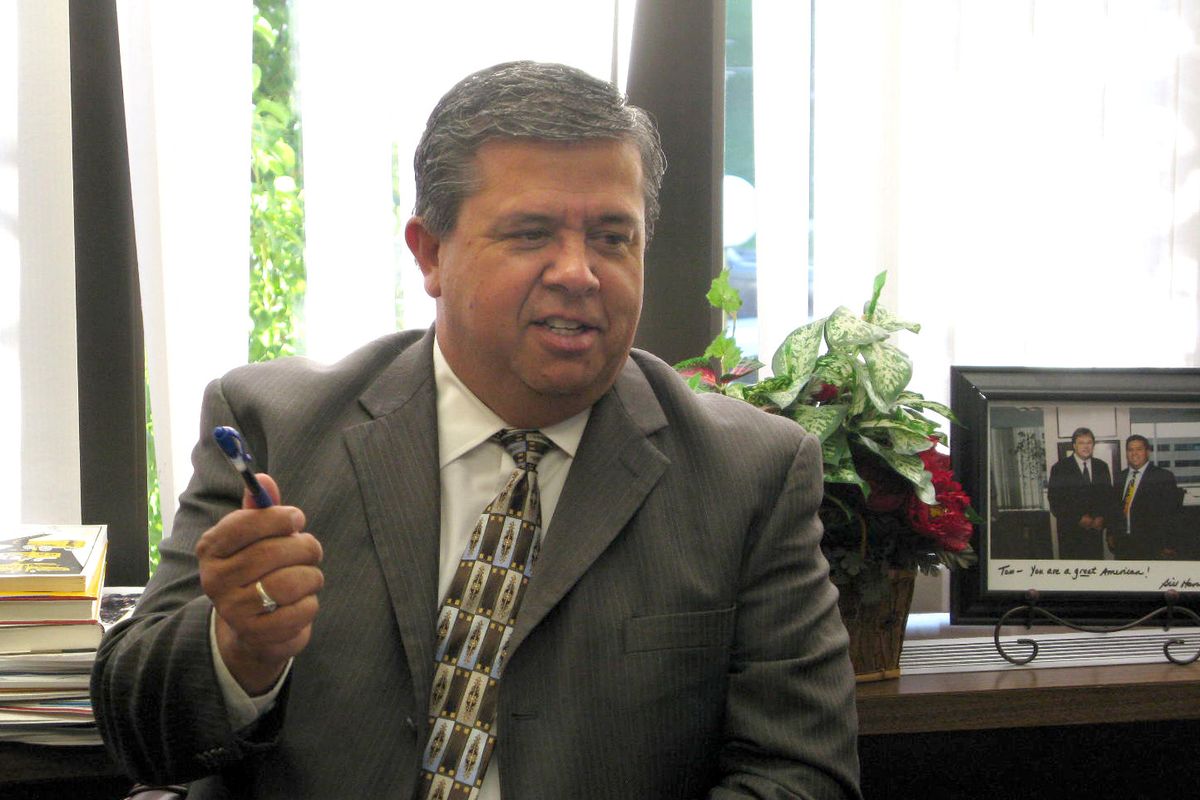Race for Idaho schools chief puts focus on role of office
Businessman Luna faces longtime educator Olson

BOISE – The first non-educator to head Idaho’s public school system is running for re-election, and he’s being challenged by one of the state’s most respected educators: the just-retired superintendent of the Boise School District, the state’s second-largest district.
The race between state Superintendent of Schools Tom Luna, a Republican businessman, and Stan Olson, the Democratic challenger who calls himself “apolitical,” is raising issues about what Idaho’s schools really need, from politics to professionalism. And it’s coming at a time when schools are struggling with huge and unprecedented spending cuts.
“I think it’s easier to lead educators when you are one,” said Steve Casey, the retired Coeur d’Alene High School principal who ran unsuccessfully for state superintendent as a Republican four years ago and now works for North Idaho College. But he said of Luna, “I think he’s done a good job given the environment that we’re in. … I think this is going to be a good opportunity for two quality candidates to deal with the issues, and I think that’s good for our state.”
Jerry Evans, former longtime GOP state superintendent of schools, strongly believes the position should be filled by an educator.
“We’ve been struggling with a strong and consistent voice for education, a place where you can go and find out what the needs of our schools are and have some confidence that it’s based on some reality,” he said. He hasn’t endorsed in the current race; he said he tries to steer clear of politics.
Luna, a college dropout who spent 25 years working for a weights and measures business – and obtained a bachelor’s degree, the minimum requirement for the superintendent job, online just before he first ran for the post – said, “My goal is to improve education so that every child benefits, and run it so that it’s responsive to the customers of education.”
Based on his background in measurement science, he’s focused on measuring and improving student achievement and says the numbers show it has worked. For example, the percentage of Idaho schools making “adequate yearly progress” under the federal No Child Left Behind law has more than doubled, an improvement other states are viewing with envy.
Olson says the AYP standard is “based on a false premise.” He said, “By 2014, every child in the country has to be proficient in language arts and mathematics; even if your IQ is 6, you have to be proficient. I want to tell you: It ain’t gonna happen.”
Proficiency has been defined as between the 15th and 23rd percentile on the Idaho Standards Achievement Test, Olson said, which he called nothing to “ballyhoo … as a significant achievement.”
He points instead to disparities between large school districts in the state and small ones, which struggle with funding uncertainty from year to year that forces stops and starts in their programs. “We don’t do very well as a state,” he said. “It has nothing to do with the intelligence of children or the abilities of teachers – it has to do with a plan and a focus and getting kids ready for not just low-bar standards, but high-bar standards.”
Luna says he’s kept his top campaign promises: Establish a “longitudinal data system” to track student achievement, a multimillion-dollar project that’s now being phased in; launch a math initiative, which has included running 5,000 Idaho teachers through an innovative one-time training class and adding a computerized math practice program to every classroom; his “classroom enhancement package,” which lawmakers funded before the current downturn to pay for such items as textbooks and teachers’ supplies; and addressing the “technology gap in our rural communities” through the Idaho Education Network, a multimillion-dollar statewide broadband system that’s in its early stages and already has linked 80 Idaho high schools.
Olson decries those as “silver bullets” rather than systemic reforms, and says there’s been no strategic plan for improving Idaho’s schools for the past four years. As proof, he points to Luna’s recent move to drop a new high school science test; science graduation requirements were increased five years ago, he said, with the idea of schools being ready for the test this year, but Luna did nothing to get schools ready.
“It has been very, very evident that we have had no leadership of the field,” said Olson. “Our field has been focused primarily on political ideology rather than educational leadership.”
Luna disagrees, saying the science test simply wasn’t a good measure of achievement. He said he’ll submit a budget proposal to lawmakers this year to increase funding for science education to try to help schools meet the new graduation requirement. Luna has been a strong supporter of charter schools and performance pay for teachers and has prominently endorsed various Republican political candidates. That prompted Olson to say the superintendent’s position “has been politicized beyond belief in the last four years.”
Olson, however, is running as a Democrat, though he says he’s nonpartisan. Of his politics, he said, “I have supported the people who have been able to really deliver the goods.”